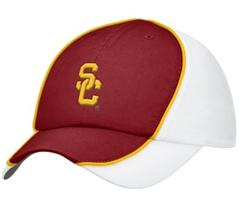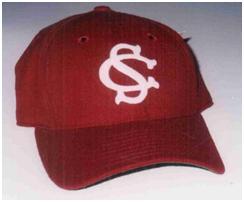SC v. SC (Fed. Cir. 2009)
The University of South Carolina (Carolina) was founded in 1801 and is the flagship public university of the state. The University of Southern California (Southern Cal) was founded in 1880 and is a large private university located in Los Angeles. This case involves a trademark dispute between the two universities.
The case arose when Carolina attempted to register its SC-logo and Southern Cal opposed the trademark registration based on its own interlocking SC-logo. [See hats below] Carolina retaliated by moving to cancel Southern Cal's trademark registration of the initials "SC" based on the mark's suggestion of a false association between Southern Cal and the State of South Carolina.


The Trademark Appeal Board (TTAB) sided with Southern Cal in (1) refusing to register Carolina's SC-logo because it was confusingly similar to Southern Cal's logo; (2) holding that Carolina lacked standing to bring the cancellation counterclaim; and (3) finding that the initials "SC" are not unmistakably associated with the State of South Carolina. On appeal, the Federal Circuit affirmed.
Confusingly Similar: The appellate panel first agreed that the TTAB had appropriately held that the SC-logos were confusingly similar despite the lack of any actual evidence of customer confusion. (South Carolina did not appeal the Board’s findings that the marks were legally identical.)
Regarding Southern Cal's registration of the initials "SC," the appellate panel rejected the TTAB's finding that Carolina lacked standing, but affirmed the summary judgment because Carolina had not shown a genuine issue of material fact for trial.
Standing in a Cancellation Proceeding: A party damaged by a registered mark's "suggestion of a false association" has a right to file for cancellation of that mark. To have standing, the party must also show a "real interest" in the proceeding and a "reasonable basis" for the belief that the mark has (or will) cause false-association damage. The Federal Circuit found that Carolina had met this test of standing because it sold goods bearing the same mark.
Standard for Cancellation based on False Association: "To prevail on a Section 2(a) Lanham Act claim for cancellation based on false association, a party must show that the challenged mark is 'unmistakably associated' with another person or institution." Here, Carolina provided evidence that the public does associate the initials "SC" with South Carolina. However, that evidence is insufficient for a false association claim because "SC" also refers to "many entities aside from the state."
Indeed, South Carolina, in the context of another issue, submitted evidence showing that at least sixteen other universities and colleges represent themselves as "SC." In light of this evidence, South Carolina did not satisfy its burden on summary judgment. Even drawing all reasonable inferences in favor of South Carolina, evidence showing that the initials "SC" could refer to the State of South Carolina does not create a genuine issue on whether the initials uniquely point to the State.
Affirmed.
As a native of South Carolina, I am regularly confused by uses of “SC” that refer to non-South-Carolina entities.